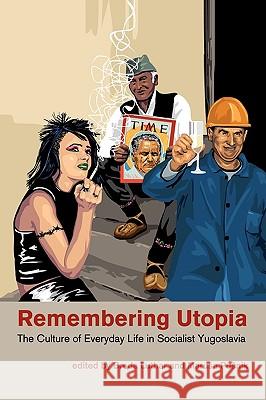Remembering Utopia: The Culture of Everyday Life in Socialist Yugoslavia » książka
Remembering Utopia: The Culture of Everyday Life in Socialist Yugoslavia
ISBN-13: 9780984406234 / Angielski / Miękka / 2010 / 468 str.
Remembering Utopia: The Culture of Everyday Life in Socialist Yugoslavia
ISBN-13: 9780984406234 / Angielski / Miękka / 2010 / 468 str.
(netto: 122,30 VAT: 5%)
Najniższa cena z 30 dni: 128,42
ok. 16-18 dni roboczych
Bez gwarancji dostawy przed świętami
Darmowa dostawa!
This collection of essays helps uncover various aspects of everyday life during the time of socialism in Yugoslavia, such as leisure, popular culture, consumption, sociability and power. This volume attempts to uncover various aspects of everyday life during the time of socialism in Yugoslavia from 1945 until 1980 (Tito's death), based on accounts of memories of leisure, popular culture, consumption, and sociability, or power, in everyday settings. Research about socialism/communism typically tends to draw attention to official aspects of power and dissent and to state politics rather than to negotiations of state power within the sphere of ordinary life. These histories stress the study of social structures and the political and institutional histories of socialism and tend to presuppose a powerful state and a party with its official ideology on one side, and repressed, manipulated or collaborating citizens on the other side. "This is a highly original project, which will cover a much neglected area, helping those who either did not make it to Yugoslavia in Tito's time or were born too late to understand what life then and there was all about." -Sabrina P. Ramet, Professor of Political Science at The Norwegian University of Science and Technology in Trondheim, Norway "This collection represents an original and highly useful work that helps fill a gap in the existing literature on socialist Yugoslavia and East-Central Europe in the Cold War. It also makes an important contribution to cultural history of the region in the second half of the twentieth century." - Dejan Djokic, Lecturer in Serbian and Croatian Studies, The University of Nottingham "This book focuses on a cultural and social history of socialist Yugoslavia from the perspective of 'ordinary' people and by reconstructing their memories. The contributors, many of them belonging to a new generation of scholars from the former Yugoslavia, employ new approaches in order to make sense of the complicated past of this country." - Ulf Brunnbauer, Department of History, Freie Universitat Berlin
This collection of essays helps uncover various aspects of everyday life during the time of socialism in Yugoslavia, such as leisure, popular culture, consumption, sociability and power.This volume attempts to uncover various aspects of everyday life during the time of socialism in Yugoslavia from 1945 until 1980 (Titos death), based on accounts of memories of leisure, popular culture, consumption, and sociability, or power, in everyday settings. Research about socialism/communism typically tends to draw attention to official aspects of power and dissent and to state politics rather than to negotiations of state power within the sphere of ordinary life. These histories stress the study of social structures and the political and institutional histories of socialism and tend to presuppose a powerful state and a party with its official ideology on one side, and repressed, manipulated or collaborating citizens on the other side. "This is a highly original project, which will cover a much neglected area, helping those who either did not make it to Yugoslavia in Titos time or were born too late to understand what life then and there was all about."-Sabrina P. Ramet, Professor of Political Science at The Norwegian University of Science and Technology in Trondheim, Norway"This collection represents an original and highly useful work that helps fill a gap in the existing literature on socialist Yugoslavia and East-Central Europe in the Cold War. It also makes an important contribution to cultural history of the region in the second half of the twentieth century."- Dejan Djokic, Lecturer in Serbian and Croatian Studies, The University of Nottingham"This book focuses on a cultural and social history of socialist Yugoslavia from the perspective of ordinary people and by reconstructing their memories. The contributors, many of them belonging to a new generation of scholars from the former Yugoslavia, employ new approaches in order to make sense of the complicated past of this country."- Ulf Brunnbauer, Department of History, Freie Universität Berlin











